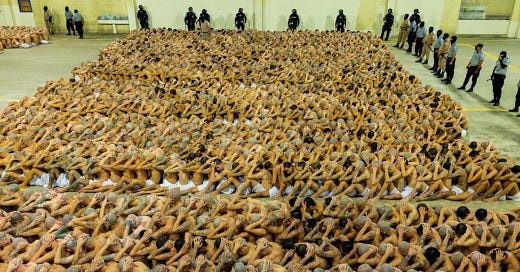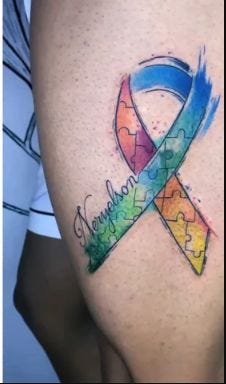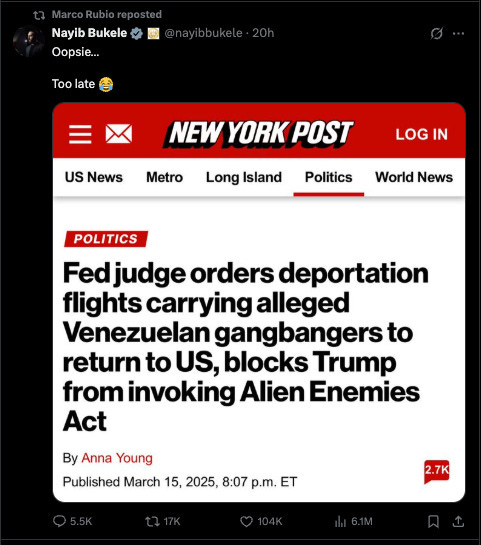Yes, the El Salvador “Deportations” are Really Bad
and not just for the innocent people who got deported
I’ve been wrestling all week to get my head around the story of the U.S. government deporting non-Salvadoran suspected gang members to El Salvador, against a judges’ orders. I knew I wanted to write about this, but I like to have a different angle on these newsletters beyond “wow, this is really bad, huh?” and my thoughts on this particular series of events hasn’t really been able to go beyond that. So: Let me explain (some!) of the ways in which this is, in fact, really bad.
First, a quick summary of the situation. On Saturday, March 15th, amid a court hearing on the subject, several planes full of Venezuelan nationals took off and landed in El Salvador, against a judge’s orders. 238 people were taken into custody by the Salvadoran government, and taken to the notorious Centro de Confinamiento de Terrorismo (CECOT), the largest prison in the Americas.
Gang databases have been bad
As with the last time I wrote in, about the kidnapping of Mahmoud Khalil, this federal action represents an escalation of existing policies that have been harming communities of color in this country for decades. Gang databases have been in place in many major US cities for decades. Black and brown folks can be added to these databases for things like: 1) wearing certain colors or items of clothing in photos 2) having certain tattoos (or ANY tattoos) 3) having contact with other “confirmed” gang members, including being assaulted by them. You can see how very quickly entire neighborhoods, already deeply surveilled by police, can become full of so-called “gang members.” Having your name appear on a database of gang affiliations means that your charges for a minor penalty might be increased, that you will be treated differently by the courts when you encounter them, that you and your friends will be under a different kind of scrutiny than that afforded to other people.
We’ve also seen the shadow of gang affiliation rear its head in immigration court before—United States v. Munoz, argued last year, hinged on the question of whether a U.S. citizen’s spouse could be denied a spousal visa simply because his tattoos made him a “suspected gang member.” Several of the deportations were justified under the Alien Enemies Act—the Trump administration claimed that their tattoos made them Tren de Aragua members—a Venezuelan gang not known for their tattoos. Among the men deported, some were likely picked up solely on the basis of their tattoos—including an autism acceptance ribbon, a child’s name and an infinity sign. Family members of these men say that they’re innocent, journalists have not uncovered any criminal convictions either in Venezuela or the U.S.—and yet, they’re now in a Salvadoran prison.
I myself am (kind of) heavily tattooed—I have leaves and flowers and squiggles going up and down both arms. I am brown, and I look like a person who spent a significant amount of time in Brooklyn in her early 20s—which I am. When I was part of the cit of Chicago’s welcome team for Venezuelan asylum seekers bussed up from Texas, I was worried about how my tattoos would be received by the recent arrivals, given that my arms were out to sit through the day in an unairconditioned gym. Instead, a guy made a beeline for me right away, and immediately asked to see my tattoos, oohing over my hand-poked gingko branch, showing me his elaborate and richly colored Japanese-inspired sleeve, and calling his wife over from across the room to show me the work he, also an artist, had done on her—delicate cherry blossoms arcing across her chest. I knew these people better because of their tattoos, understood them as lovers of beauty (and Japan!), knew the things that mattered to them. I’ve been thinking a lot about them this week.
CECOT is horrifying
Back in 2019, I took a fact-finding trip to an immigration detention center in the U.S. south. It was, of course, owned by a private prison corporation, holding ICE detainees fresh from the border. As we toured the facility, I was mutely horrified at the kinds of constraints that prison life forced onto someone. People had no privacy, no right to quiet, no ability to choose when to be awake or asleep, when to eat. The men I interviewed told me they didn’t really have access to materials in their own language, that they only got rec time if the guards were in a good mood, which was rare. I detail the experience more fully in my book, Rivermouth: A Chronicle of Language Faith and Migration, but the trip stuck with me—I had never been inside a prison, hadn’t seen the ways its policy and architecture and everything conspired to dehumanize the people inside.
And then, in 2022, the government of El Salvador released the photos above, of men waiting to be transferred into the Centro de Confinamiento del Terrorismo, a prison built by Salvadoran strongman president Nayib Bukele to imprison MS-13 and other gang members. Many of the men in that photo have gang tattoos and are actually confirmed to be gang members (not just “confirmed”). I have worked with people whose lives have been drastically shaped by their encounters with MS-13–people who have fled their homes, lost family members, been threatened and assaulted and raped by members of this gang. And yet, I look at that photograph and think—surely no one deserves this.
Men in CECOT are kept in their cells 23.5 hours of every day, approximately 150 men to a cell, stacked on 4-tiered bunks without sheets or mattresses. Their heads are shaved, they are denied visitation, recreation, phone calls or utensils. Bukele claims that all the Salvadorans held within CECOT will remain there for life. There’s been no real update on the ultimate fates of the people transferred there from the U.S.
Sub-reason: Nayib Bukele Sucks
The president of El Salvador is…bad. Elected in 2015, he’s the author of such hits as “Bitcoin is a national currency now” “I’m going to build a nightmare prison with a capacity of 40,000” “The Supreme Court is going to reinterpret the constitution to allow me a second term” “I’m going to send 40 armed soldiers into the Legislative Assembly building for no reason while the legislature votes on whether to fund my pet project to the tune of $109 million.”
You knew this guy wasn’t great from the moment he told Marco Rubio he’d take deportees to house them in Salvadoran prisons…for a fee, but he’s got a long history of corrupt, violent, and stupid behavior. The U.S. is propping up this man’s regime in exchange for the tremendous violence he is able to enact on people.
The Constitutional Crisis of It All
So hopefully, the last few sections have really impressed upon you just how dire this situation is, but I think back in the U.S., there’s even another angle to it, which is the constitutional crisis of it all.
As I mentioned, the government was in the midst of being enjoined from carrying out these deportations literally as flights were taking off. The exact sequence of events is a little wonky and weird, and led to Press Secretary Karoline Leavitt truly splitting hairs on whether a verbal or a written statement from a judge was more binding—but I think this timeline from the AP is pretty clear.
In short—the ACLU had filed a lawsuit trying to prevent five of their clients from being deported under the Alien Enemies Act, a 1798 law last used to justify Japanese Internment during WWII. The judge in the case, James E. Boasberg, issued a temporary restraining order, preventing the deportation of these five individuals, and setting a hearing to see if the class of people who should not be deported needs to be expanded. At that hearing, the Justice Department attorney says he doesn’t know if deportations are planned. Planes take off en route to El Salvador. Judge Boasberg recalls the planes first verbally and then in a written decision. Planes keep taking off.
Nayib Bukele posts this tweet, it is re-circulated by Marco Rubio and the White House Communications office.
Trump suggests Boasberg should be impeached, Chief Justice John Roberts issues a strongly worded rebuke. The DOJ files a motion essentially telling the courts to butt out of the executive branch’s business.
I know every-other-issue in the last several months has been viewed through the lens of a constitutional crisis (DOGE, birthright citizenship, mass firings, withholding of funds), but when I look at this, I see the real deal. I’m not, by any means, a constitutional scholar, but I see one branch of government rebelling against the checks placed on it by another, and suggesting that their power is absolute instead. We learn from a very young age that our government is based on this tripartite distribution of power—checks and balances. While elections have consequences—in this case, closely-aligned executive and legislative branches meaning that things are going fast and loose, the judicial branch is theoretically (and in this case plainly) a check against unconstitutional actions from the other two branches.
As someone who worked at an immigration legal organization during the previous organization, it sometimes bothered me how much we rely on the slow workings of the judiciary system to provide checks for plainly unconstitutional behavior—sure, a temporary restraining order or an injunction would be placed, but only after people had already been, say, deported to El Salvador. Still, I watched over and over again as impact litigation worked to curb the worst of the Trump administration’s violent, xenophobic impulses. This last week of decisions begins to erode even that slim level of protection.
I could probably write another several letters—about the history of the right-wing takeover of the federal judiciary, about the stuff going on right now with Big Law and the Trump administration making it even more unlikely that these checks will continue happening, about all the people I’ve met who have been chewed up by a system awaiting a judge’s decision on the policy that ruined their lives, but I think, for now, I’ve hopefully managed to convince you that this is the constitutional crisis we’ve been expecting.
I don’t know what to suggest at this point—sure, call your congressman, donate money to the orgs fighting this stuff, if you happen to know any of these 238 families, hold them close however you can.
Alejandra Oliva is an essayist, embroiderer and translator. Her writing has been included in Best American Travel Writing 2020, and was honored with an Aspen Summer Words Emerging Writers Fellowship. Her book, Rivermouth: A Chronicle of Language, Faith and Migration, was published by Astra House, and received a Whiting Nonfiction Grant. She was the Yale Whitney Humanities Center Franke Visiting Fellow in Spring 2022. You can find her newsletter here.









wow. absolutely horrific. thank you for writing about this. i am shocked but grateful you’re knowledgeable and sharing it as well as your experiences (the tattoo story that connected you and two asylum seekers is beautiful), as we all need to know just how dire it is
i have no words, really. but thank you for explaining all of this. it’s so horrifying.